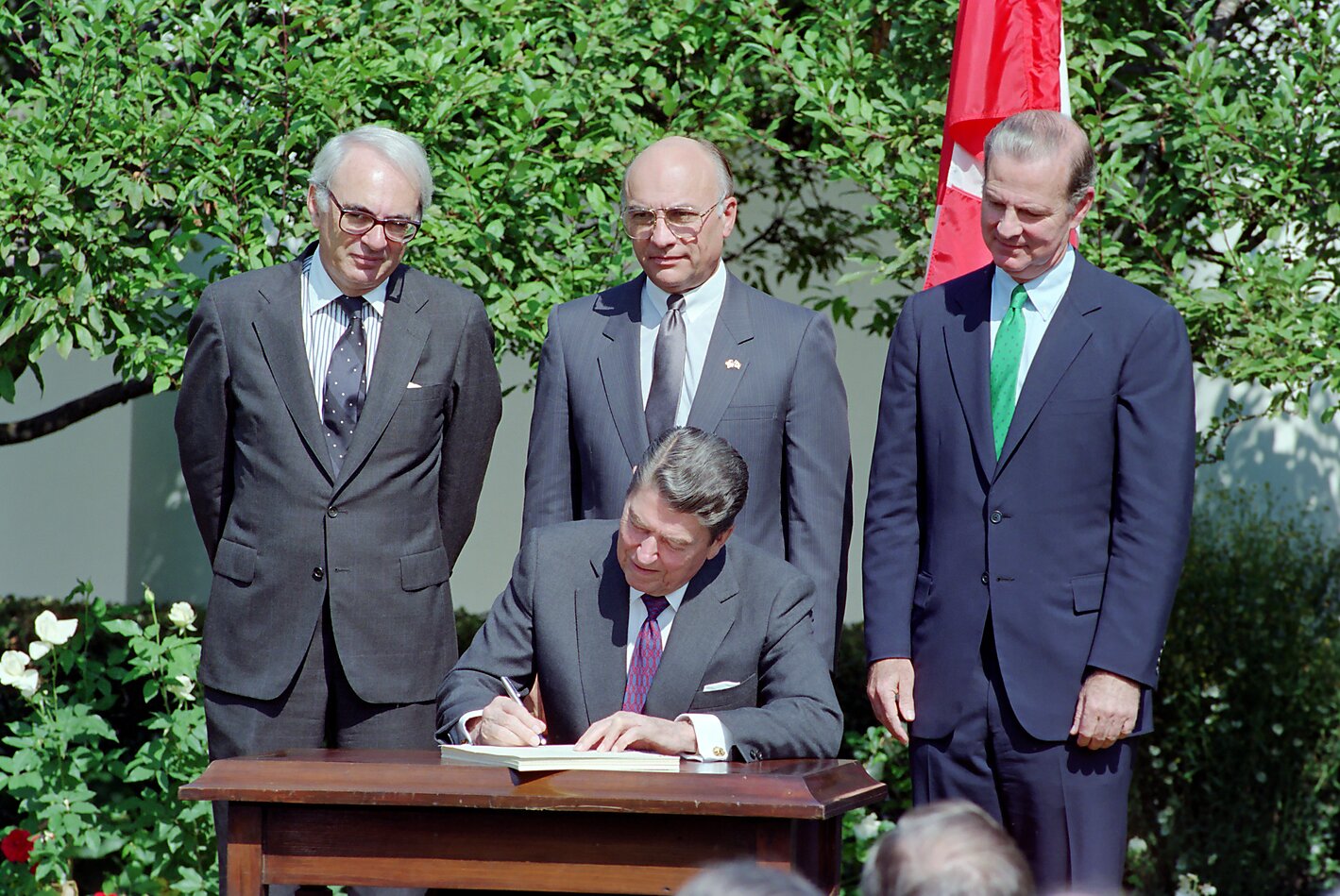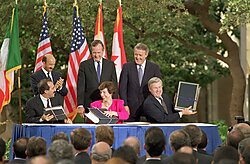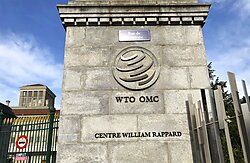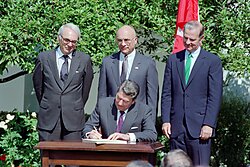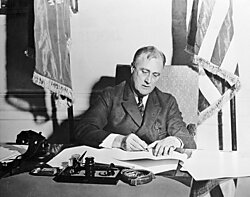-
Free trade is consistent with conservatism’s historical and intellectual roots, including the writings of Edmund Burke, Adam Smith, and the Founding Fathers. American conservatism has long advocated economic freedom, of which free trade is a vital component.
-
National security–based arguments for trade restrictions are almost always disguised protectionism. Conversely, open trade helps strengthen national security.
-
Conservatives have long believed that families and communities are integral parts of a free and prosperous society. Free trade complements both.
-
Free trade policies help the working class and domestic manufacturers. Protectionism empowers government bureaucrats and enriches well-connected lobbyists.
-
Ultimately, free trade is merely an extension of human freedom more broadly.
A number of years ago Saturday Night Live featured a skit of a fictional game show asking contestants to answer the question as to between two celebrities, “¿Quién es más macho?,” or “Who is the manliest?” The late Ricardo Montalban fared well. Today within the Republican Party and the broader conservative movement the popular question is now “Who is the most conservative?”
Many self-styled conservative talking heads and members of Congress are calling for industrial policy, forms of wage and price controls, and new federal agencies to police free speech. Such positions have historically been anathema to the conservative movement and should remain so. Along with these issues, there is likely no other issue more timely or relevant to the question of just who is—and what is—a conservative than the issue of globalized free trade.
History
To settle the question of who may legitimately claim the title of “conservative” today, a quick reminder of the movement’s origins and evolution and their relation to trade is helpful. Although admittedly there is no universally held definition of conservatism, there have been broadly recognized and accepted core principles, as well a proud historical lineage. The English parliamentarian and philosopher Edmund Burke is generally recognized as the father of conservatism. Burke, throughout his career, advocated for freer trade. He understood that trade is not a zero-sum game between countries. In supporting reduced trade barriers between Britain and Ireland, Burke argued, “The prosperity which arises from an enlarged and liberal system improves all of its objects; and the participation of trade with flourishing Countries is much better than a monopoly of want and penury.”
His arguments included those based on economic utilitarian grounds. For example, he argued in Parliament that a free market without government interference is the best method to help the poor. As conservatives today continue to fight the rise of the social welfare state, they have historically recognized, as did Burke, that cost-increasing protectionism simply creates greater welfare dependency, not less.
Burke’s more impassioned and important argument, however, rested upon a recognition and reliance upon natural rights (conservatives should think, “We hold these truths to be self-evident …”). Burke believed that these rights clearly entitled and protected an individual’s right to both own property and to trade it freely.
For decades, most conservatives have proudly viewed themselves as free-market conservatives, a moniker whose principled intellectual foundation rests upon Adam Smith’s classic work An Inquiry into the Nature and Causes of the Wealth of Nations. Noteworthy, Smith was a friend and contemporary of Burke. Smith skewered the prevailing mercantilist and protectionist policies of the day and argued on utilitarian grounds that freedom of trade across international borders benefited the masses. He wrote, “Trade which, without force or constraint, is naturally and regularly carried on between any two places is always advantageous.” Some modern-day conservatives have now begun relying on the limited exceptions to the free trade rule (e.g., national defense) that Smith enumerated in his work to justify their protectionism. But any plausible reading of Smith indicates that these exceptions are just that—exceptions—which he further explained were rarely justified and often subject to abuse.
Today one of the greatest accolades within the conservative movement is that of “constitutional conservative,” a term meant to convey fealty to the Founding principles contained within the Declaration of Independence and US Constitution. Any conservative would be well advised to carefully reread the Declaration’s list of the repeated “injuries and usurpations” of the Crown, which evidenced its tyranny and justified American independence. The list includes “cutting off our Trade with all parts of the World.” Thomas Paine, author of Common Sense, the most influential pamphlet of the Revolutionary Era, wrote that to a trading country, freedom of trade was “of such importance, that the principal source of wealth depends on it; and it is impossible that any country can flourish … whose commerce is … fettered by laws of another.… A freedom from the restraints of the Acts of Navigation I foresee will produce … immense additions to the wealth of this country.”
In addition to Paine, most Founders believed in the goal of free trade and viewed it as necessary for the prosperity of the republic. They believed the principal and proper use of tariffs should be limited to revenue raising, not protecting domestic industries. In fact, at the dawn of our republic and for more than a century thereafter, the bulk of tax revenues were derived from import duties, given their relative ease of collection, as Phil Magness lays out in his Cato Institute essay on the history of tariffs in the United States between 1787 and 1934. The other recognized legitimate use of tariffs was to incentivize other nations to open their borders to our trade. These purposes are in distinct contrast to the purposes proposed by many today who seek to engage in industrial policy that benefits discreet economic sectors or industries or that promotes economic nationalism designed to severely limit or close off our international trade.
Article l, Section 8 of the Constitution unequivocally gives Congress the power to both “regulate Commerce with foreign Nations” and to “lay and collect Taxes, Duties.” Because of this section, some argue that conservatives stand on firm constitutional ground in favoring the imposition of tariffs. It should be noted that Section 8 also empowers Congress to borrow money. Given the magnitude and dangerous trajectory of the national debt, few conservatives believe the exercise of such power a wise one. The same is true for the imposition of tariffs.
Finally, the most conservative leader of the 20th century, President Ronald Reagan, confidently proclaimed that in America, “Our trade policy rests firmly on the foundation of free and open markets.” Although Reagan did implement some protectionist measures, they were part of his broader efforts to stave off even worse protectionism from Congress and to push for broader liberalization through the US-Canada Free Trade Agreement (the North American Free Trade Agreement’s [NAFTA’s] predecessor) and the US-Israel Free Trade Agreement, as well as launching negotiations that led to the creation of the World Trade Organization (WTO), the successor to the General Agreement on Tariffs and Trade (GATT). Trade doubled on his watch.
There has been debate over the use of tariffs ever since America became a constitutional republic. There have been times in our history when, regrettably, tariffs carried the day. And certainly, there have been tariffs enacted that have arguably fallen into Smith’s enumerated and limited exceptions. What isn’t debatable is that the conservative movement has always rested on a firm foundation of personal freedom, including economic freedom, based on natural rights, and at least in the post–World War II era, this has always included the freedom to trade.
Thirty-five years after Reagan, President Donald Trump tweeted, “The word TARIFF is a beautiful word indeed,” as he proceeded to impose 10–50 percent tariffs on steel and aluminum and a wide array of Chinese goods. He has now doubled down and called for a universal 10 percent tariff on all foreign-produced goods. Although conservatism has been the political movement supporting free trade for decades, a number of self-styled conservatives are now abandoning this long-held conservative principle and are finding common cause with both Trump and the majority of protectionist Democrats on the issue. They shouldn’t, and their arguments in doing so are unpersuasive.
National Security and Protectionism
The number-one argument proffered to support protectionism is one based on national defense. After all, even Adam Smith admitted that national defense considerations were, of necessity, one of the exceptions to the free trade rule. However, from my personal experience of serving 16 years in Congress, I know firsthand how often bad policy is wrapped in the cloak of national defense.
When Trump unilaterally imposed his steel and aluminum tariffs in 2018, he did so under the authority of Section 232 of the misnamed Trade Expansion Act of 1962. To exercise that authority requires a finding that the imports in question threaten to impair national security. However, in the same year that the tariffs were imposed, James Mattis, then secretary of defense, noted that only 3 percent of US production of steel and aluminum were actually needed for our armed forces. That begged the question of how, then, steel and aluminum tariffs were justified for everything from automobiles to beverage cans. Do some truly believe that a Toyota 4Runner or a can of Heineken beer threaten our national security?
Another example of the argument occurred during debate of the annual National Defense Authorization Act (NDAA). An amendment was offered to effectively force the military to buy only US-made running shoes for new recruits. Are running shoes critical to our national defense? Incidentally, the amendment would have had the effect of benefiting only one company: New Balance. It was argued that many running shoes sold in America are manufactured in China. True, but they also continue to be manufactured in Taiwan, Indonesia, Finland, Italy, and Thailand as well. Should running shoes truly become critical to the defense of our nation? Could we not stockpile them when global prices are cheap? In a time of war, would we be unable to ramp up our own production of running shoes? After all, during World War II we showed that we could ramp up domestic production of aircraft from just over 2,000 in 1939 to 300,000 by 1945. Hard to believe we’re incapable of doing the same for running shoes or an array of other goods in the 21st century.
During debate on another NDAA bill, an amendment was offered to force the military to only buy stainless steel flatware from domestic sources. In opposing the amendment during debate, House Armed Services Chairman Mac Thornberry (R‑TX) remarked, “I just don’t think that the knives and forks we use qualify as vital national security.” What does negatively impact national security, though, is the needless depletion of national wealth that occurs every time the government fails to buy the best product at the most economical price.
Washington undoubtedly has legitimate concerns over supply chain reliance on China for products with a clear national security nexus. But many companies are already in the process, or have completed, a reengineering or relocation of their supply chains, and with additional conservative tax and regulatory policies, even more would do so. Importantly, there remains a whole host of export controls, foreign direct investment approvals, and defense procurement requirements to help meet the threat that China poses. When it comes to our national defense, clearly the Trump administration’s tariffs didn’t mute China’s saber rattling, its defense buildup, or its incursions into the South China Sea to threaten Taiwan.
As an aside, it needs to be noted that, in almost all respects, the tariffs imposed on Chinese goods by the Trump administration failed. The trade deficit, which remains a most misleading statistic but one favored by the former president, actually worsened during the Trump administration. Furthermore, tariffs proved to be a two-way street—as they usually do. Just ask the Midwest farmers who suffered massive losses from retaliatory tariffs from China and had to be bailed out with $28 billion of subsidies from the US taxpayer. Finally, it could not be clearer that the tariffs not only had no impact on weakening China’s military, but they also clearly had no impact on China’s human rights abuses or its carbon footprint.
More often than not, the national defense argument for protectionism is unjustified and should never become a pretext for the abandonment of free trade in favor of industrial policy, corporate welfare, and protectionism. These all harm economic growth and innovation and consequently harm our national defense.
Additionally, although trade does not guarantee peace—Russia’s gruesome invasion of Ukraine even though the two nations have a fair amount of two-way trade, for example—there is clear evidence that trade ties tend to reduce armed conflict between countries. This is consistent with what pro-market Enlightenment philosophers argued. Beginning in the aftermath of World War II, the United States used trade as a tool to enhance national security. It has been nearly 80 years since major world powers engaged in a major war—a period of relative peace that has coincided with the establishment of the US-led global trading system.
Likewise, trade can be an immense tool for American soft power. It helps spread American values and it enriches allies. In the early 1990s, Mexico was facing a policy choice: it could either continue down the path of protectionism and heavy government intervention, or it could move “toward decentralized, democratic capitalism.” The George H. W. Bush and Bill Clinton administrations understood that by better integrating the Mexican economy into the United States’ economy, NAFTA could nudge Mexico away from the false allure of socialism. On top of the economic benefits of NAFTA, the agreement was a foreign policy success. Although certainly not perfect, and despite some recent backsliding, Mexico today is more committed to binding and predictable international trade and investment rules than it was in the 1980s and early 1990s.
Too often trade is viewed as weakening America’s national security when in fact it’s usually the opposite.
Trade, the Working Class, and Domestic Manufacturing
Another prominent argument offered by self-styled conservatives is that free trade somehow hurts the working class. Conservatives undoubtedly consider the Tax Cuts and Jobs Act of 2017 (TCJA) to be the crowning achievement from when Republicans last governed. Yet many who heralded its pro-growth tax relief for working families turned around and supported tax increases on these very same families in the form of tariffs.
Countless studies have shown that almost all the costs of the tariffs initiated under the Trump administration were borne by consumers and businesses. At worst, these costs may have offset most of American households’ average savings from the TCJA (Figure 1). For example, the cost of a washing machine increased an average of $86 just months after tariffs were imposed on them. According to the American Action Forum, all those tariffs combined have now increased consumer costs approximately $51 billion a year. Some tax cut. To make matters worse, the Tax Foundation calculates, based on current levels of imports, that Trump’s universal 10 percent tariff proposal represents a whopping $300 billion tax increase. Just when did tax increases become popular among conservatives?
Today, most blue-collar workers work in services, not manufacturing, and their greatest concern is not the loss of their job due to foreign competition, it is the loss of buying power from a paycheck that has shrunk in the face of historic inflation. I doubt many so-called elites shop at Walmart, but many working people certainly do. If a customer buys a Zebco fishing rod there it has been produced in China, and if they pick up a pair of Cowboy Cut Wrangler jeans, they’ll likely have come from Bangladesh. Although Walmart doesn’t like to advertise the fact, it remains the nation’s largest importer, with its shelves stocked with tons of foreign-produced goods that help working families make ends meet. Tariffs wouldn’t bring back manufacturing jobs that produce fishing rods or blue jeans; they’d only make those products more expensive.
Closely related to the working-class harm argument is the loss of manufacturing jobs argument that others refer to as a “hollowing out” of the industrial heartland. Indeed, manufacturing employment as a percentage of the workforce has decreased dramatically over the past several decades. But contrary to popular belief, those jobs have not been lost to hamburger-flipping jobs but instead to transportation, warehousing, construction, health care, tech, communications, finance, and other service-oriented parts of our economy—industries that benefit from open trade and whose jobs pay far more than those in low-skill manufacturing. America’s comparative advantages in these industries is one of the reasons why we are the world’s number-one exporter of services and continuously run a services trade surplus.
The dominant factor in the loss of domestic manufacturing jobs is not foreign competition but instead productivity. For example, according to the American Iron and Steel Institute, it took 10.1 hours to produce a ton of steel in 1980; today it takes only 1.5 hours. There may be fewer manufacturing workers today, but because of productivity gains, they are better compensated. According to the Center for Strategic and International Studies, the median income of the remaining US blue-collar manufacturing jobs has increased 50 percent in real inflation-adjusted terms between 1960 and 2019.
The reality is that tariffs harm most manufacturing jobs. Relatively open trade is vital for manufacturing and our defense industrial base. As the Cato Institute’s Scott Lincicome and Alfredo Carrillo Obregon document, around half of all goods imported are in fact intermediate goods, raw materials, and capital equipment used for domestic manufacturing. For example, many pipeline manufacturing companies import specialty casing that is necessary for oil and gas pipelines. Taxing these imports hurts workers at these companies or, if the higher costs are passed on, their energy-producing customers. How ironic for any conservative to call for an “all of the above” energy policy (one that supports the development and deployment of every form of energy) yet support making hydrocarbons more difficult and expensive to produce.
We could strengthen domestic manufacturing, the defense industrial base, and our energy sector by unilaterally eliminating tariffs on intermediate inputs, raw materials, and capital equipment. Doing that would truly put America first.
Trade, Family, and Community
Trade makes the necessities of life cheaper and more abundant for families. Walking through a grocery store reveals that a lot of our everyday food items are imported from around the world. This raises real incomes for Americans by increasing their purchasing power. Indeed, according to recent research from the Peterson Institute for International Economics, reduced friction in international transactions since the end of World War II—from trade liberalization and improvements in transportation and technology—increased US gross domestic product by $2.6 trillion in 2022 dollars, or about $7,800 per person and $19,500 per household. A 2016 study from two economists estimates that trade particularly benefited low-income consumers, who spend more of their income on items that were traded, including manufactured goods and food.
Although the gains over the last 75 years have been significant, there is more work to be done. Consider a family outfitting their kids to go back to school in the fall. As Bryan Riley of the National Taxpayers Union recently noted, backpacks face a 17.6 percent tariff and rulers face a 13.6 percent tariff; meanwhile, blue jeans face an 8.4 percent tariff and shoes face an average tariff of 10.8 percent. Eliminating these tariffs on basic family necessities would raise real incomes of American families.
Likewise, trade benefits communities and civil society. Because of relatively open trade, we can consume more for less and, as a result, we can work fewer hours, which means that it frees up time to participate in activities that build community, whether it’s volunteering, going to church, or coaching tee-ball. (The bats and tees are probably imported too.)
Moreover, although the media focuses on midwestern cities that hurt by import competition, there are countless stories about cities and towns that were once hurt by imports but that now thrive, in large part because of international trade. Take the border areas in Texas. They once had large concentrations of low value-added manufacturing. But according to the Federal Reserve Bank of Dallas, “NAFTA, along with other market forces and technological change, created different jobs in Texas as low value-added manufacturing jobs were lost and as trade and investment increased. Border cities went on to gain far more employment than what they lost amid increased imports from Canada and Mexico and shifting production between the countries.” Indeed, economic integration has been enormously beneficial for Texas. The same Dallas Fed report notes, “A 10 percent increase in manufacturing on the Mexican side of the border increases employment 2.2 percent in Brownsville, 2.8 percent in El Paso, 4.6 percent in Laredo and 6.6 percent in McAllen.”
Conservatives have long argued that family and communities are the bedrocks of a free and prosperous society. Freer trade complements both. It’s surely not a cure-all for what ails our culture, but it helps. And the things that actually have hollowed out many American families and communities go way beyond economics. The underlying causes lie more in the realm of cultural changes and bad public policies, especially in the area of welfare. Tariffs can’t fix problems that trade didn’t cause.
Protectionism, Bureaucracy, and Rent Seeking
One of the great rallying cries of many conservatives remains “Drain the swamp!” But after the previous administration imposed its tariffs, it immediately empowered hundreds of Washington bureaucrats at the Department of Commerce and the Office of the US Trade Representative to grant individual waivers from these very same tariffs under what can at best be described as an opaque process with discretionary standards. As one company officer of a small pipeline manufacturer put it, “[Applying for a waiver] is a nightmare, like dealing with a lawyer and the IRS at the same time.” A schedule of tariffs doesn’t drain the swamp; it instead fills it with a cadre of well-connected lawyers, lobbyists, and special interests to work a system run by Washington bureaucrats.
It is difficult to comprehend how one can proudly wave the Gadsden flag, proclaiming “Don’t Tread on Me,” and then seemingly turn around and remark, “But go ahead ‘swamp,’ take away my freedom and choose for me which products I’m allowed to buy.”
Others charge that global trade is inherently antithetical to American interests. Notwithstanding being polysyllabic, “globalization” is now treated as a four-letter word. Although “globalization” is not clearly defined, the word conveys to many not just a loss of American jobs but a loss of American interests, prestige, identity, and perhaps most importantly, a loss of American sovereignty. Undoubtedly what comes out of the vast array of international organizations and forums in which the United States participates has helped fuel these fears. Even if it is not harmful, US membership in many of these may be of dubious value to some conservatives. As one former Congressman said in private conversation, “Why do we continue to pay the UN to insult us when they’d likely do it for free?” Conservatives legitimately question whether it is truly in America’s interest to participate in global conferences and organizations such as the United Nation’s Climate Change Conference, the Inter-American Development Bank, and the International Trade Union Confederation.
What can’t be questioned, though, is that Article I, Section 1 of the Constitution still reads, “All legislative Powers herein granted shall be vested in a Congress of the United States …” (emphasis added.) What can’t be questioned, though, is that Article II, Section 2 still reads in part, “[The President] shall have Power, by and with the Advice and Consent of the Senate, to make Treaties, provided two thirds of the Senators present concur.” Whatever treaties we enter into, and whatever commitments we make to other countries or international organizations, are an exercise of US sovereignty, not the loss of such. And what we enter into, we can exit. The United States unilaterally terminated its first treaty in 1798 and has done so on many occasions since.
No nation-state or international body can compel us to do anything without our consent. Should we choose to walk away from an agreement or treaty, the other party or parties may, of course, then choose to treat us in ways in which we prefer to not be treated. But again, they simply cannot sanction us with fines or loss of property without our consent. Our elected officials may agree to be bound by certain international rules or obligations whenever they decide the mutual pledges of other nations are in our national interest. But whenever “We the People” disagree with those decisions, we have the opportunity to unbind ourselves by electing either a new president, a new Congress, or both.
When it comes to our trade relations, the WTO is singled out for usurping US sovereignty. It doesn’t. It is simply a voluntary organization of trading nations attempting to come to consensus on accepted trade rules. Once rules are agreed upon, the organization attempts to arbitrate and it makes rulings by interpreting those rules. The WTO itself doesn’t initiate action and has no ability to enforce dispute settlement rulings other than by authorizing a complaining (winning) member government to deny a responding (losing) member government some of the benefits of membership. The WTO is a most imperfect organization that is in constant need of reform. But it usurps no US sovereignty, and we have more global trade benefiting the United States because of it.
Conclusion
In the final analysis, the most important reason anyone calling themselves a conservative should remain committed to trade has nothing to do with economics. Instead, it has everything to do with securing “the Blessings of Liberty to ourselves and our Posterity,” something for which our Founders risked their lives, fortunes, and sacred honor. Trade should not be viewed as a matter of discretionary foreign policy or a lever to promote economic nationalism. And although the data and historic evidence is overwhelmingly convincing that trade leads to greater economic growth, ultimately trade remains an issue of personal freedom, specifically economic freedom and its relation to private property. To “Buy American” should not be a matter of where one buys. For conservatives, it should instead be a matter of how one buys, and that how is with freedom of choice. If the conservative movement is to still stand for freedom of speech, freedom of enterprise, and freedom to bear arms, as a matter of principle it must firmly and unequivocally stand for freedom of trade.

This work is licensed under a Creative Commons Attribution-NonCommercial-ShareAlike 4.0 International License.
